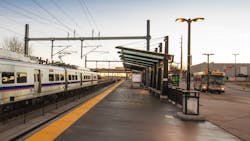Denver RTD calls all bus and rail operators back to work
The Regional Transportation District (RTD) of Denver is recalling all full-time union employees and is beginning the process to bring back all 137 part-time operators, RTD General Manager and CEO Debra Johnson told a board of directs committee and all RTD employees. RTD has been working closely with the Amalgamated Transit Union (ATU) Local 1001 to bring back employees.
Callbacks are following a process outlined in the collective bargaining agreement that governs all of Denver RTD’s represented employees, with certified letters being distributed to affected employees last Friday, Jan. 14, Johnson said. Because these are safety-sensitive positions, employees must complete drug and alcohol testing before they can return to work.
“We endeavor to have people back in their seats as quickly as possible,” Johnson said of the full-time employees being recalled. Only a few have declined to return due to individual circumstances. “At the outset, we would say early next week, contingent upon the testing process.”
Of recalling part-time operators, Johnson said, “We are optimistic that we will be moving full steam ahead.”
RTD in September announced that it was planning to reduce its budget and staffing levels in response to significant financial shortfalls in 2021 and subsequent years as a result of the COVID-19 pandemic. The agency in early December notified the operators who would be laid off, and it notified additional union staff and salaried staff in early January. Over the last month, Denver RTD rescinded some of the operator layoffs as other operators left through attrition, which happens naturally throughout the year. The staffing reductions included 309 represented employees and 90 salaried employees.
On Jan. 11, Denver RTD was notified by the Federal Transit Administration that it would be receiving about $203.4 million through the Coronavirus Response and Relief Supplemental Appropriations Act of 2021 (CRRSAA), as part of the $14 billion allocated in support of U.S. public transit systems to help offset impacts from the COVID-19 pandemic. The intent of the apportionment for Denver RTD, and all transit agencies, is to keep transit operations moving, which includes employee retention.
The return of operators will allow Denver RTD to provide supplemental service as needed as staff evaluates how to optimize service levels. There are no plans to rescind layoffs for salaried staff, since those positions were eliminated after evaluating the functions that would be necessary to support an ongoing, much-reduced level of service. Denver RTD has been operating since April 2020 under a COVID-19 service plan, with changes made in response to decreased ridership as a result of the pandemic.
“We are looking at service adjustments,” Johnson told employees, with agency leadership working with ATU 1001 to make some modifications. “Rest assured that we are going to have people readily available to deliver transit services to those that most need it.”
Johnson acknowledged that Denver RTD is appreciative of its apportionment of the CRRSAA funding, which is making the callbacks possible. That said, she noted, “We still have financial challenges in front of us. We will be good stewards of public taxpayer dollars and will be making very diligent decisions as it relates to what our path forward is.”
